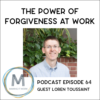Best of Daily Reflections: Why Forgive Someone Who Wronged You? Part 1
Daily Reflection / Produced by The High Calling
Get rid of all bitterness, rage and anger, brawling and slander, along with every form of malice. Be kind and compassionate to one another, forgiving each other, just as in Christ God forgave you.
Ephesians 4:32
Have you ever wondered why you should forgive someone who wronged you? I expect you have. I know I have. To be sure, at times, when an offense is minor, I don't worry about why I should forgive. I just do it. But at other times, when someone has deeply hurt me, I have wondered why I should forgive that person. Holding onto unforgiveness feels so safe, even so justifiable. Forgiveness seems to require opening myself up to being hurt again, which is the last thing I want to do.
So, why should you forgive someone who wronged you? If you're a Christian who seeks to live according to biblical wisdom, then there is a simple answer to this question. You should forgive because the Bible says so. Ephesians 4:32 makes this clear, even though the command to forgive comes as a participle ("forgiving") following the main imperative ("be"). Other passages in Scripture make a similar point (see, for example, Matt. 6:12-15; Luke 6:37; Col. 3:13).
But Scripture doesn't merely command us to forgive and leave it at that. It also provides a rationale and a motivation for forgiveness. Ephesians 4:32 reads, "Be kind and compassionate to one another, forgiving each other, just as in Christ God forgave you." In this verse, forgiving is an expression of kindness and compassion. As followers of Christ, we are to be people who treat others kindly as a tangible expression of grace. One way to do this is by forgiving them when they have wronged us. Kindness implies and leads to forgiveness.
Moreover, we are to be compassionate, which may also help us to forgive. When we see people as one-dimensional wrongdoers, we might find it hard to forgive them. But if we get inside their shoes, indeed, inside their hearts, we may be encouraged to forgive. I think, for example, of a man in my church in Irvine who sometimes said rather mean things to me. His behavior was not right. Yet I knew that he had been hurt by the far worse meanness of his own father. He was acting out of pain that was deeply embedded in his memories. When I allowed myself to feel the struggles of his wounded heart, I found it easier to forgive him.
Why should you forgive someone who wronged you? Yes, because Scripture commands it. But also because you are to show kindness to others and to feel compassion for them. Kindness and compassion not only require forgiveness, but also help us to do it.
QUESTIONS FOR FURTHER REFLECTION: Why do you forgive others? When there are times when you'd rather not forgive, what do you feel and think? How might Ephesians 4:32 help you to forgive? Is there someone in your life whom you need to forgive today? Are you willing to have the Lord help you act kindly toward and feel compassion for this person?
PRAYER: Gracious God, you know that forgiveness doesn't come easily to me, especially when someone has hurt me deeply. I like the feeling of self-righteous judgment. And I really like the feeling of safety that comes with unforgiveness. Moreover, if I'm going to be really honest with you—which is always a good idea—there is part of me that likes to make others feel the pain of my unforgiveness. My vengeful heart wants wrongdoers to feel a bit of the hurt they have done to me.
So, I begin by asking you to forgive me for my unforgiveness. But I also ask for your help. Lord, you know that sometimes it is very hard to forgive. I know I'm supposed to do it, but I don't want to, at least not for a long while. Help me forgive as a gesture of kindness, as a demonstration of grace. Give me a compassionate heart, even for those who have done me wrong. May I see them in their full humanity, in their neediness and woundedness, not to excuse their wrongdoing, but rather to find the resources to forgive them according to your Word.
O Lord, may I know the freedom and cleansing that comes through forgiving others. Amen.
______________________________
Stewardship of Creation
The mission of Leave No Trace is to teach “people how to enjoy the outdoors responsibly.” It’s an ethics program based on protection and preservation. Biblical stewardship of the environment respects this high standard, then takes it a step further—adding propagation to the mix. We’re hardwired to create, so when God told us to work the earth and take care of it, he gave us permission to make beauty out of the basic; to turn raw ingredients into art, science, entertainment, and nourishment. How we do this matters greatly, and it starts with responsibility.
Our Stewardship of Creation series at The High Calling explores how daily decisions can leave the world better than we found it. We hope you’ll join us for the conversation.







